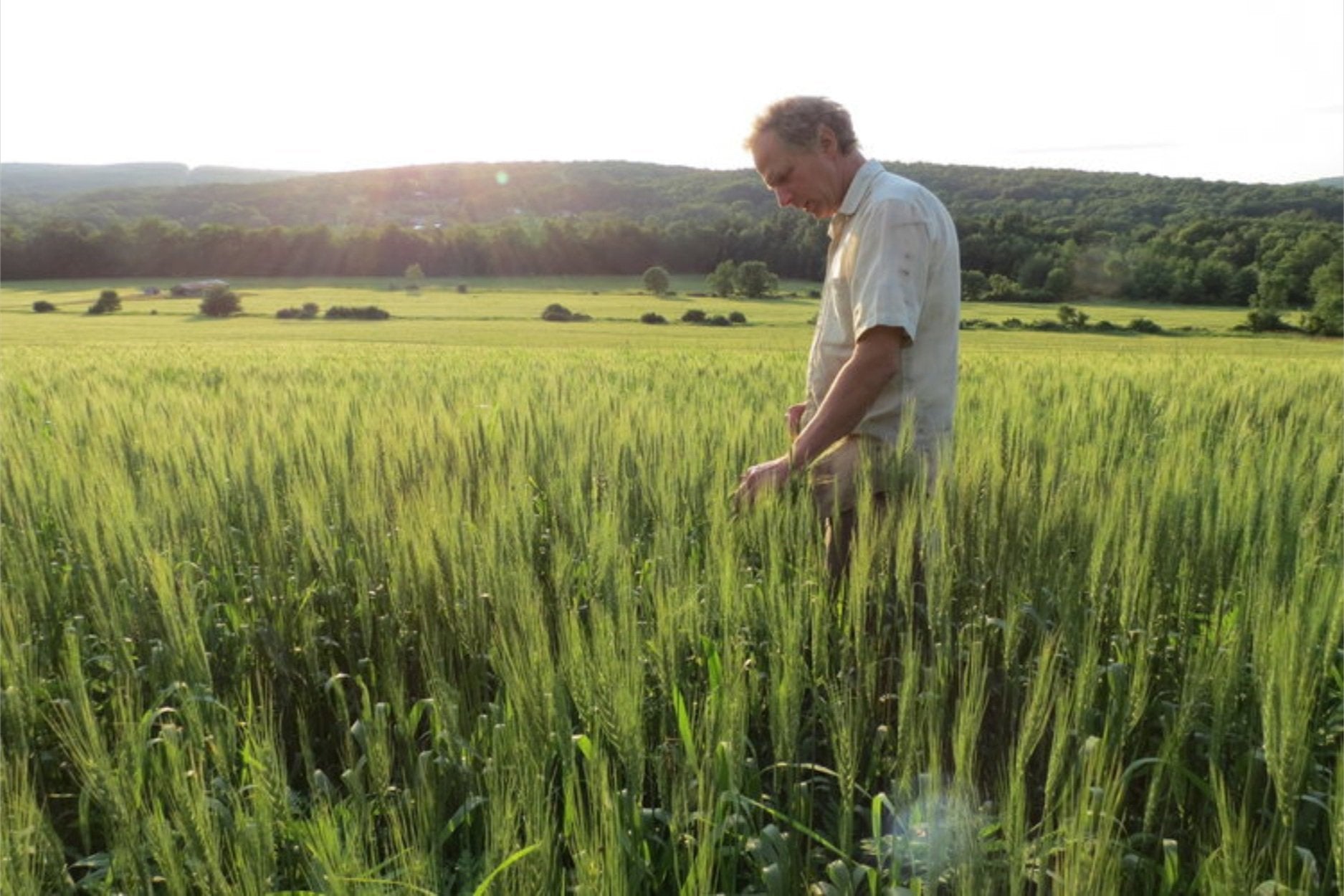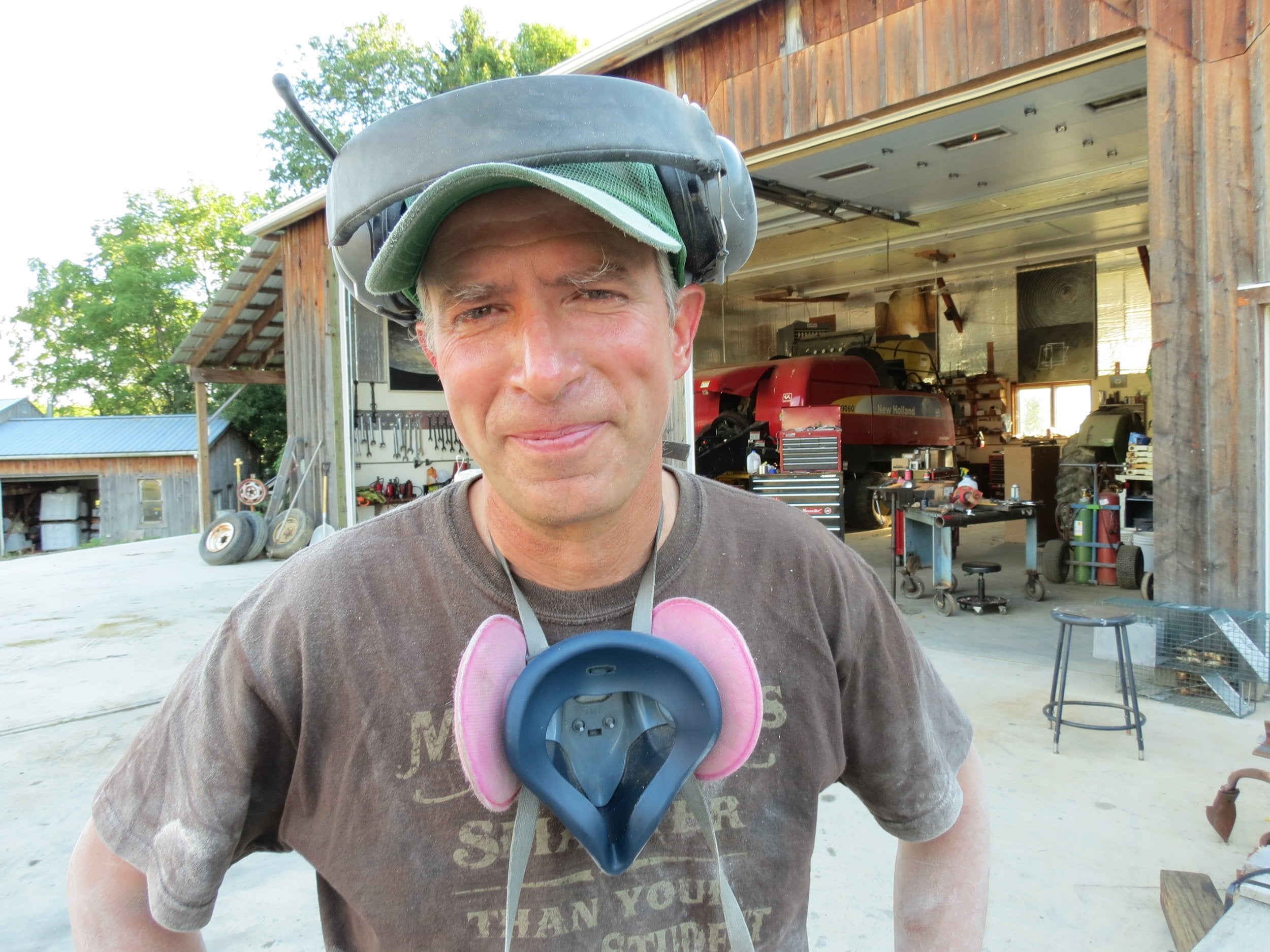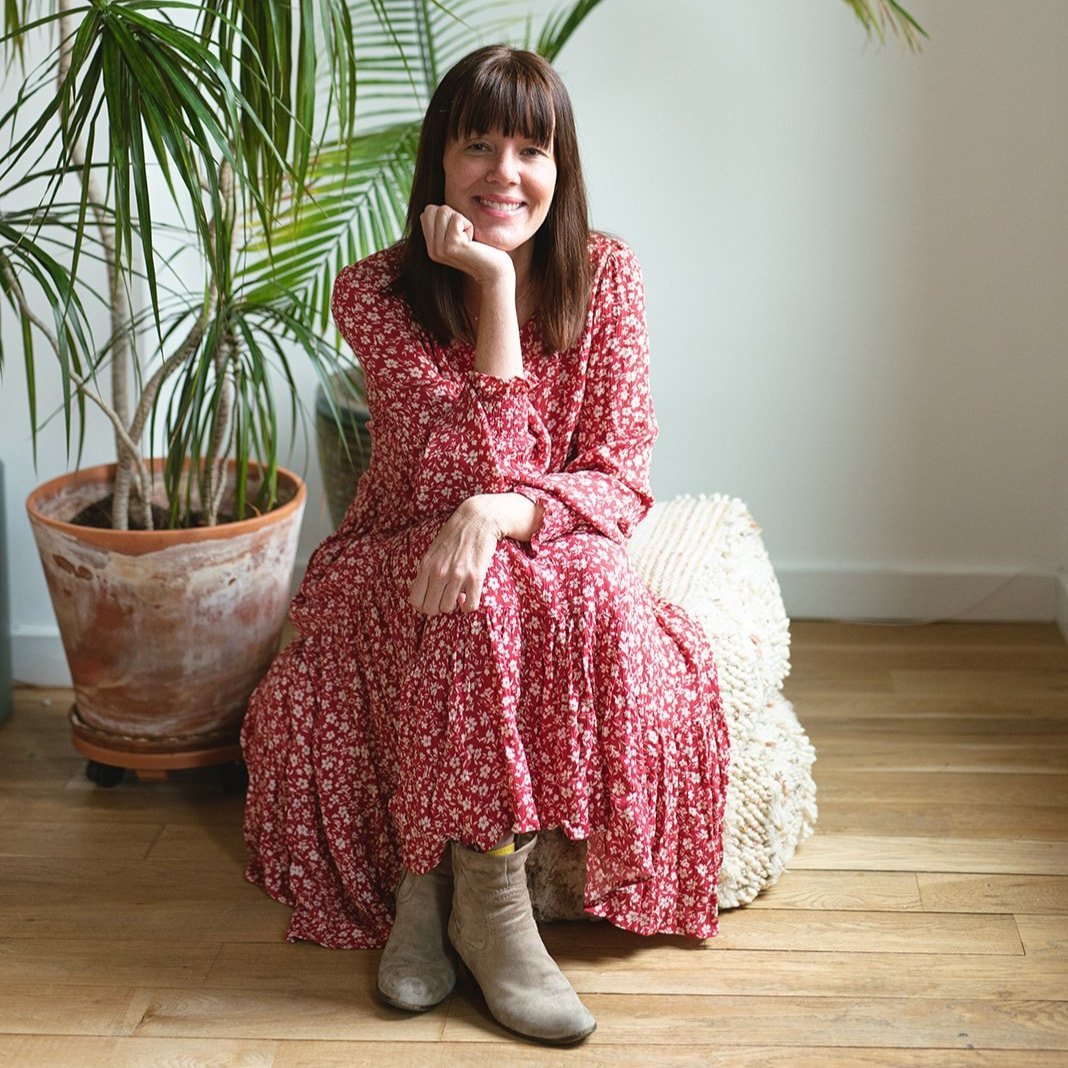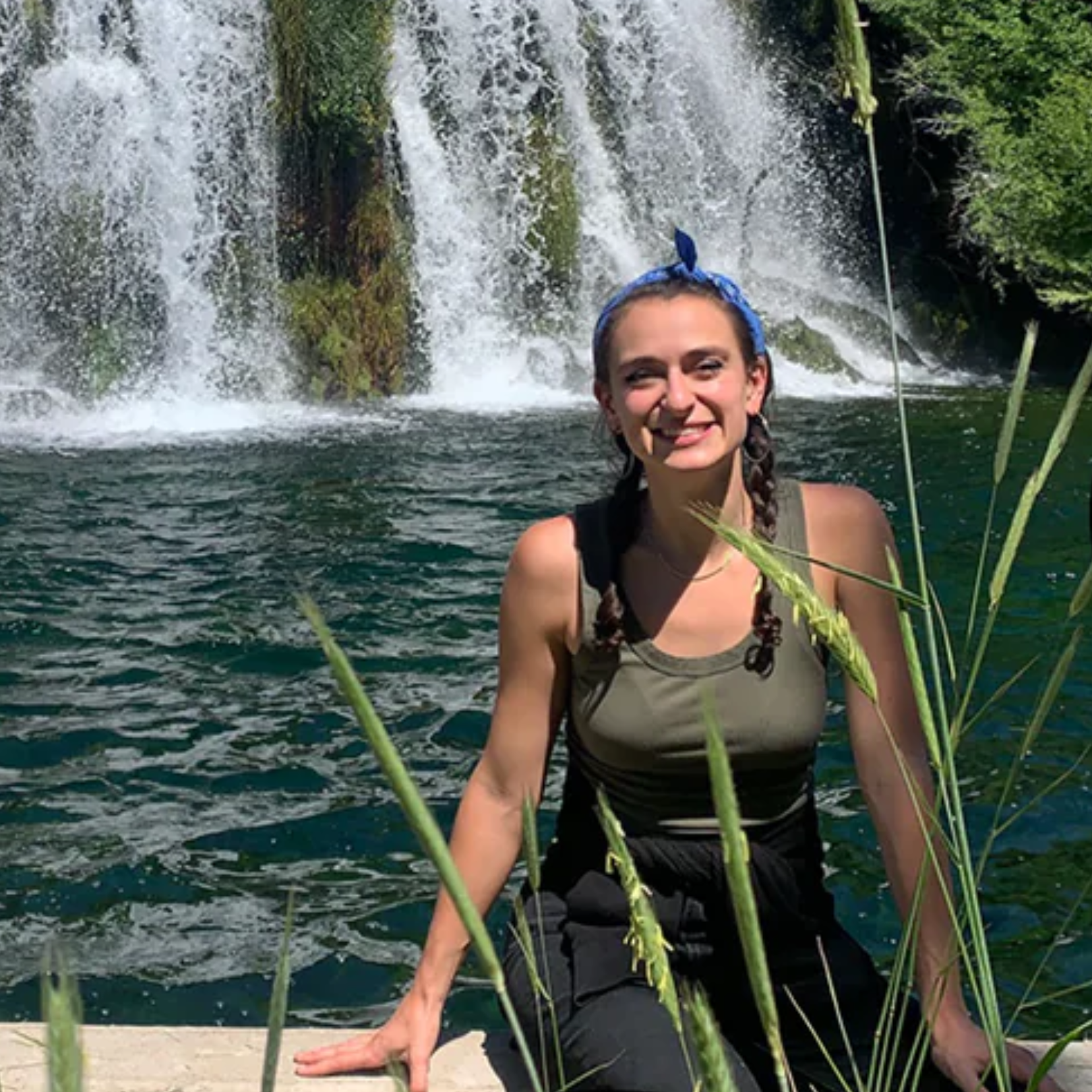Growing Organic with Thor Oechsner

Thor Oechsner in a field of spring wheat. Photo from Oechsner Farms
As the pandemic hit, our Mast team purchased a beautifully handcrafted grain mill in order to produce fresh organic flour for our house baked goods, sourdough bread program, and packaged flour available at our two retail locations and our online store. The multi-purpose, whole wheat, bread, einkorn, rye, and spelt flours are stone-milled using certified organic grains from Oechsner Farms, a 1,200-acre corn and wheat farm in the Finger Lakes region of upstate New York.
Though varieties like hard red winter wheat, rye, and buckwheat are the farm’s primary focus, founder and owner Thor Oeschner also grows a handful of cover crops to improve the soil, an organic farming practice that’s beneficial for the earth and his cash crops. Clover, for example, doesn’t directly generate significant profits, but is crucial for soil fertility management.
This method, and many other arduous processes, are required to earn an organic certification from the USDA—but Thor thinks it’s worth it. “Agriculture is inherently destructive,” he explains. “So you have to pick what system you feel like is doing the least amount of harm to the environment and is the healthiest for the end user.”
Thor provides grains to his own flour mill, Farmer Ground Flour, as well as local bakeries, breweries, and distilleries that use them to create bread, beer, spirits, and more—so his meticulous organic farming practices have quite a far reach. Here, he shares how exactly this system works, why it’s advantageous for everyone involved, and why he became a farmer in the first place.
Mast Journal: What does organic farming entail?
Thor Oechsner: In its most basic format, organic farming entails not using any input. That means you’re not using any sort of chemical insecticide or herbicide or fertilizer that they consider restricted in the production of crops. It also entails looking at how you affect the environment around the farming, the farm and the fields that you work, what sort of crop rotation you use, testing the soil to make sure you're not depleting. It's organic matter and safe storage methods. You're basically trying to farm the way someone maybe would've farmed before World War II and the advent of all this chemical stuff, using good crop rotations to feed and improve the soil and not using any synthetic anything to grow it.
MJ: That makes sense. How do you become a certified organic farmer?
TO: To get to sell your products as a certified organic grower, you have to be certified by the USDA’s National Organic Program. Every year, you have to apply and put in all the written paperwork. If that's approved, you present your organic systems plan to the USDA. You have to answer all these questions about your practices, like what is your crop rotation? And how are you making sure that you're not depleting the soil organic matter? And how are you managing hedgerows to promote wildlife? It can go on and on and on and on. Then you have to show proof of the inputs that you used—you have to show receipts—and make sure that those meet the specifications of the National Organic Program.
After you get your organic system plan approved, you go through an onsite inspection by a certified inspector who comes and looks at every single field, looks at all your crops, looks at your facilities, goes through your books, and makes sure that what you said you grew and what you sold both add up. It’s called a mass balance. If there isn't a balance there between your acreage, your average yield, and what you sold, they want to know where the rest of it came from, to prevent fraud. So all that has to be looked at and checked out.
So that's kind of the process that you have to go through as an organic grower. And a lot of guys don't want to get their whole bookkeeping system and the way that they farm as intrusively looked at. So I think that prevents a certain amount of people from going into it, but I don't really see another way of making sure people are doing it the way it's supposed to be done. Because people try to cheat the system, on all fronts, on all occasions, in everything we do as humans.
MJ: That’s a lot of work! What are the benefits of organic farming for the consumer?
TO: I see purchasing food as voting for a certain type of agriculture that you want to see happen, right? I started out as a conventional farmer. I used chemicals when I went to Cornell, back in the eighties. All they taught me was how to use chemicals. And I came to organic farming through seeing that these chemicals were toxic. I was polluting my own well and all the wells of the people around me and the streams that I fished in. I wanted to figure out a way that I could farm that was somehow less damaging to the environment and healthier for humans than what I was doing as a conventional farmer.
MJ: You mentioned you studied at Cornell. Were you in the agricultural program there?
TO: I was, yep. I got a bachelor's of science in agriculture.
MJ: Is that what put you on the path to becoming a farmer?
TO: No, that actually started really early. I grew up in the suburbs outside of New York City. My dad was a sixth grade social studies teacher in the Ossining Public Schools. But luckily for me, my mom's side of the family was from a farm in Pennsylvania, where my grandfather grew up. So my uncle still had that dairy farm. And in the summers we always went there for a few weeks. So as a little tiny kid, I got exposed to milking cows and everything that was going on on my Uncle Cecil's farm. And for whatever reason, I don't know why, but that was just the coolest thing I had ever seen in my life.
I was bound and determined, probably from about age eight, that I was going to become a farmer, come hell or high water. So I was sort of always on the path. But my uncle's farm went out of business—they went bankrupt when I was probably 15. So when I graduated from high school, I wanted to go to ag school. Cornell is just the state ag school. It sounds very lofty because it's an Ivy League school otherwise, but Cornell has the State University of New York Agriculture School. The land grant college is just on the same campus as Cornell. So it’s maybe not as impressive as it sounds.
MJ: It's still impressive! And do you find that having gone to agriculture school was helpful in becoming a farmer?
TO: For me, it was really key. The things I learned about actual farming weren't particularly that helpful, although they were really interesting. But kind of by dumb luck, I ended up taking a lot of farm business management and finance classes. And the financial stuff I learned at Cornell—they had really good professors in the ag economics department—that was the key. I tell anybody who wants to be a farmer to take finance courses because it's a business and the money will make or break you. I owe Cornell a lot for that knowledge. Not necessarily so much about how you grow wheat or how you grow corn—that you can learn anywhere.
MJ: How did you decide those were the crops you wanted to focus on in the first place? And how did you get started?
TO: When I was growing up in the suburbs, there weren't a whole lot of farms around, so I ended up on this livestock farm. I ended up working in the slaughterhouse for years and years and years. And I knew I didn't really want to do that. But I always liked making hay and stuff for the livestock that we were feeding there. I really enjoyed being out in the field and out on the tractor and messing around with the crops that we grew, a little bit more than working with the animals that we raised.
And then when I graduated from Cornell, my friend and I were going to take over his dad’s dairy farm. I thought that that would be my entrance into agriculture. But he and his dad started fighting and the whole thing fell apart, so I ended up moving back to Ithaca. And for the time, I kind of gave up on my farming dream because it just seemed too daunting. I opened up a VW Audi repair business and started fixing cars. I did that for 10 or 12 years and I bought a little tiny farm and I thought, ‘Well, I'll just have a couple of pigs and a big garden.’
Then some land became available and I rented it, and then I bought a little bigger tractor, and then I bought a little pull behind the combine and my whole farming fever came back to me. And next thing I knew, I was renting more land, buying a bigger tractor, and then I sold my shop, and I kept renting more land whenever I could find it. It was difficult to accumulate land. But with the type of farming that I wanted to do, which was field crops like corn and wheat, you need a lot of acres to do it. It isn't like a vegetable farm where you can have 10 acres and make a living on that. Because of the value of the crop, you're producing a lot of something that really isn't worth that much. So you need a lot of numbers of it to make it pencil out.
I knew I needed to get to 400 acres in order to quit my day job. I had taken a job teaching diesel mechanics at the local vocational high school here. And that was great because I had my afternoons off to work on the farm. I would find abandoned pieces of land and if they had small trees and bushes and I would go in and clear it, like some fucked up pioneer. I'd find out who owned it, and I'd call 'em up and say, ‘Hey, I'm the young farmer. I want to get your land back in shape, and would you be willing to let me do that? And if you do, then New York State will give you a tax break on it because it's agricultural land.’
Everybody I called was like, ‘Yeah, do it. That's great.’ And so I just picked up a lot of weird pieces of land that nobody wanted to farm anymore. And that's how I got started. Once I started rolling and people saw me around and heard that I was farming organically, a lot of people started coming to me and saying, ‘Hey, would you farm my land? I don't want chemicals sprayed on it anymore.’ And so being organic helped me a lot once I was able to get somewhat established. I got a lot of people to rent me farms based on the fact that they didn't want all those chemicals around them.
MJ: Wow.
TO: But it took a long time. I quit my shop in ‘97, and I think in 2003 or so I started farming full-time. And then since 2003, my family has lived off of a hundred percent farm income. And that was my goal from the beginning, to earn all of my living off of agriculture and not have to work a part-time job or have my wife work off the farm or anything like that. I wanted it to pay its way.
MJ: Who do you sell your grain to?
TO: My biggest customer is my flour mill, Farmer Ground Flour. But at the very same time I was starting this flour mill with my partner Greg, New York state passed a farmer distiller law and a farmer brewer law, which gave very cheap, easy-to-get liquor licenses to producers of spirits and beer in New York. But the caveat to that was you had to use 65% New York state grain, or you couldn't have the license. So that was the best thing New York state could have possibly done for me because all of a sudden all these businesses are looking for local grain that was cleaned and ready to use. And just by total dumb luck, I had started this flour mill and bought special equipment and learned how to do all this cleaning and was set up to do it. And so when people started looking, a certain percentage of them found me and I started working with them. And that's been really fun.

“I’ve been looking at this for almost 30 years and I’m still amazed every time that these little seeds turn into plants. And to see them come up healthy and then later on be in the combine and harvest it and taking it all the way to flour and then have a loaf of bread—seeing the whole process of food production from the very beginning all the way through. That’s pretty cool.”— Thor Oechsner
MJ: That's great that the laws worked out in your favor.
TO: It was kind of perfect. I just was at the right spot at the right time. And New York State is not the best wheat-growing area in the country—there's a reason that moved out west, because of all the humidity. There are a lot of disease problems and quality problems that we can get in our wheat for flour. So there are certain years where a percentage of the crop doesn't make flour grade, and it's good to have outlets like a distillery that can take something that's a little off-spec for flour and make it into a nice alcohol because some of the traits that they want are negatives for flour.
MJ: So if a regular consumer wanted to try a product that was made with your grain, like beer or whiskey or bread, where should they look?
TO: Oh boy, that's a good question. In terms of beer, typically what happens is we sell grain to a malt house. The malt house malts the grain, and then they sell it to the breweries. I happen to know we've sold to Brooklyn Brewery, down in the city. Actually a lot of my grain goes to Massachusetts, to Valley Malt. My two favorite breweries in Massachusetts that they sell it to are Exhibit A Brewing and Wormtown Brewery. Both of those guys make great beer and they're really committed to using local grain. And a lot of my wheat goes to Peak Organic, which is an organic brewery up in Maine.
The distilleries are different because they're taking raw grain and making it into distilled products. We work with Matchbook Distillery, out on Long Island, Van Brunt Stillhouse, Breuckelen Distilling. We just started working with Alton Distillery in the Catskills and Wigle Whiskey, out in Pittsburgh, P.A. They're an organic distillery. Cathedral Ledge Distillery and Tamworth Distilling. We’ve got a lot of distilling customers and they're really usually a really nice bunch of folks to deal with.
MJ: The alcohol community must be pretty fun?
TO: They're totally fun. I just went to the National Craft Maltsters Guild conference in Portland, Maine, and oh my God, did I have fun! Yahoo, it’s just a bunch of really cool people. Part of what I enjoy about this whole value-added grain thing is all the relationships that you get to develop and the people that you meet. And the fact that your product doesn't just go on a tractor trailer truck and head off to some place you don't even know and get turned into feed. We're selling direct. And those people are always sending us samples of whatever they're making and come to visit and we go to visit them. Next summer, me and my friends from Valley Malt are going to take their sailboat across the Long Island Sound and stay over with the people at Matchbook Distillery. So it's all a fun bunch.
MJ: That's great. Food and beverage people are happy people. They're fun to be around.
TO: Yeah, definitely.
MJ: And what about bread? Are there specific bakeries that use your grain?
TO: I'm part owner of a bakery right here in Ithaca, Wide Awake Bakery, and they use our flour. Red Hen Bakery, up in Vermont, and there are a ton of places down in New York City that use it, like Bread Alone and She Wolf Bakery.
MJ: That’s awesome. What’s your favorite part about living on a farm?
TO: I like the work a lot, and I don't mind working seven days a week. I honestly really enjoy every aspect of grain farming. I don't think there's a job that I do—even the really dirty, dusty ones—that I don't enjoy. Right now, we're planting spring wheat. When we see those first little shoots and then we start seeing green rows come up—it’s a fucking miracle every single time I see it. I've been looking at this for almost 30 years and I'm still amazed every time that these little seeds turn into plants. And to see them come up healthy and then later on be in the combine and harvest it and taking it all the way to flour and then have a loaf of bread—seeing the whole process of food production from the very beginning all the way through. That's pretty cool. And I love that. And I love the community of people around here that are farming. It's a pretty tight-knit bunch. Organic farms, conventional farms—it doesn't really matter. We're all in the same boat and we all help each other out. And I like that.
More from The Journal

In conversation with Chrissy Fichtl, founder of home fragrance company, Apotheke.
Read more
Gone Fishing with Becca Millstein
In conversation with founder and CEO of sustainable tinned seafood company, Fishwife.
Read more